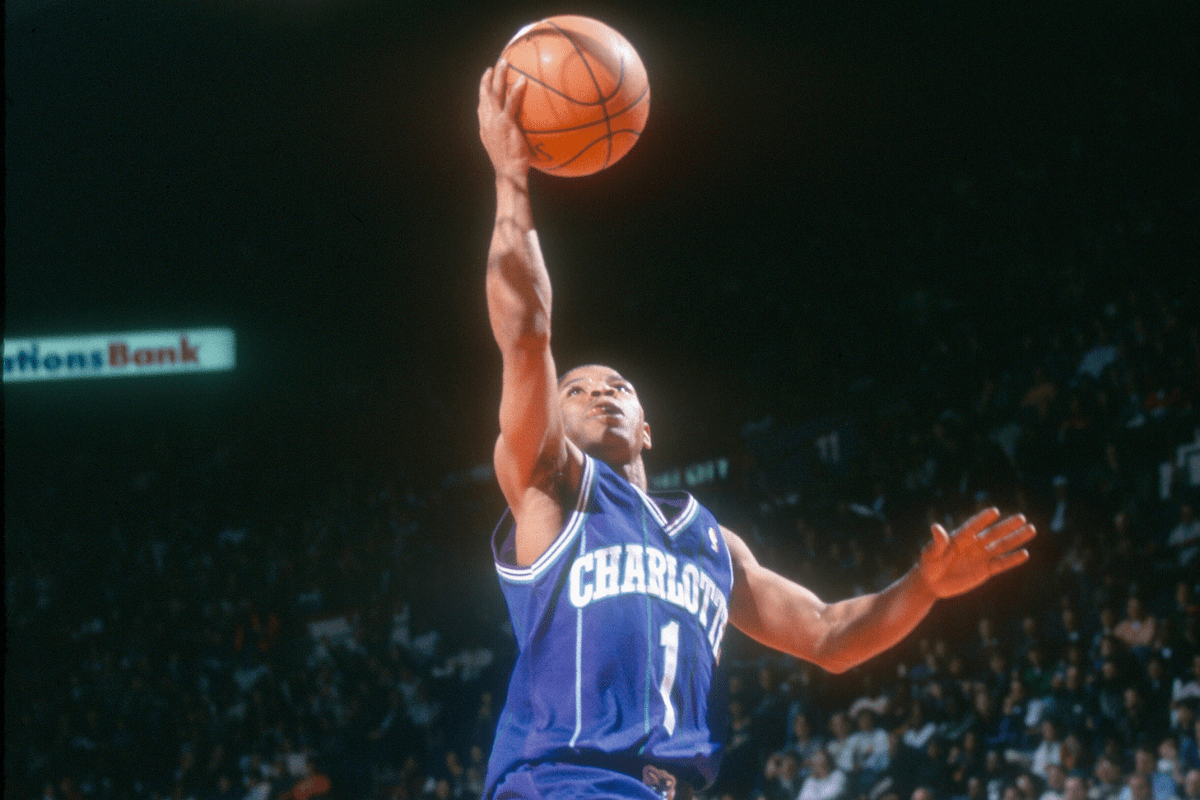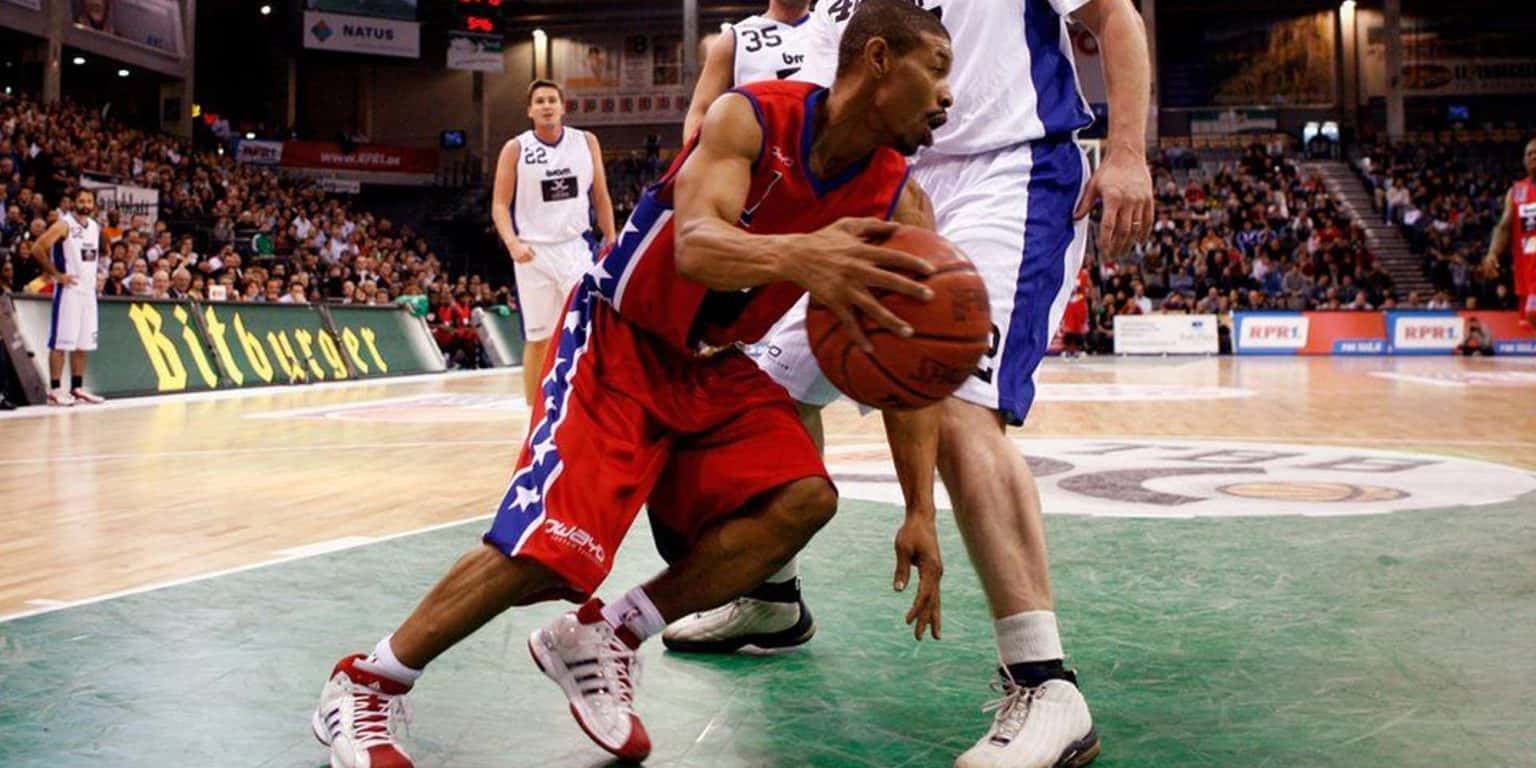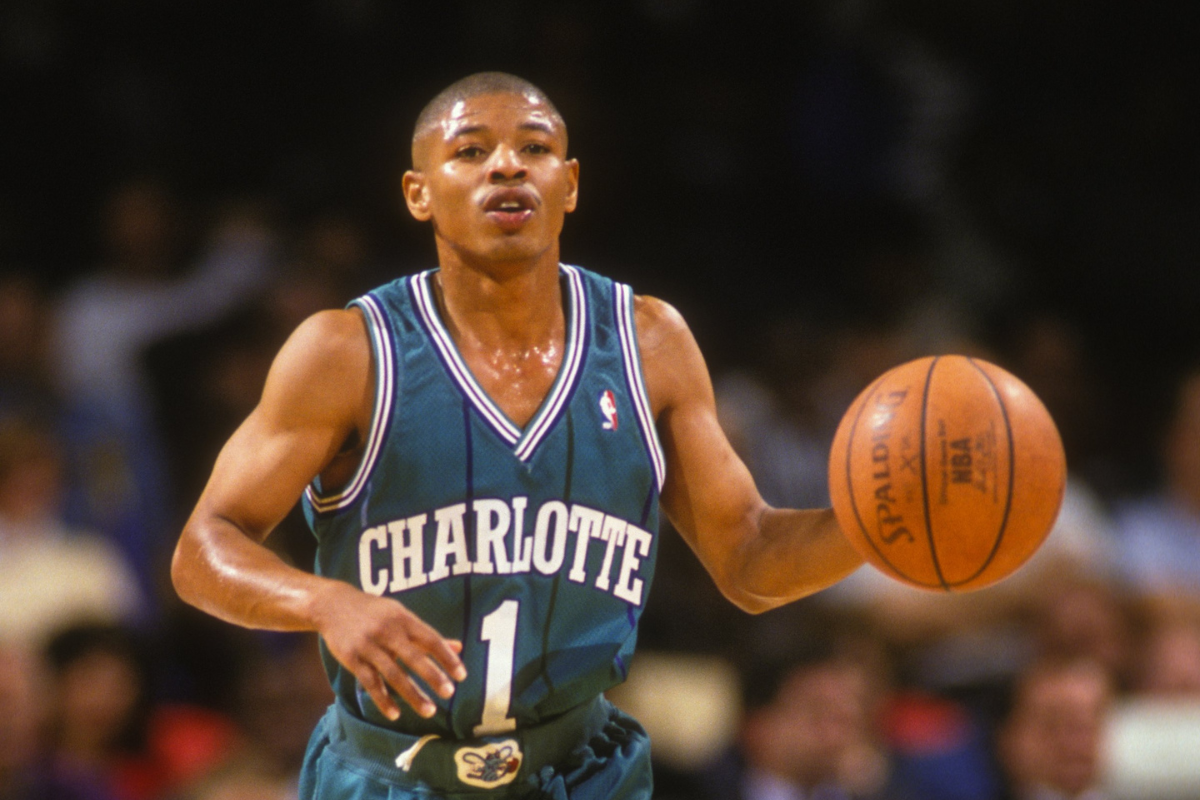When you think about basketball, your mind often pictures towering athletes soaring through the air, smashing dunks that leave fans in awe, or so it seems. Yet, a different kind of image comes to mind when considering Tyrone "Muggsy" Bogues, the shortest player to ever grace the National Basketball Association's courts. He stood at just 5 feet 3 inches, a truly remarkable height in a sport dominated by giants, you know?
This stark contrast naturally sparks a fascinating question among basketball fans and casual observers alike: could Muggsy Bogues dunk? It's a query that has, in a way, become a topic of considerable discussion and debate, lingering in the minds of many who remember his incredible career. The idea of someone so comparatively small performing such an explosive act, well, it really captures the imagination.
This article aims to explore that very question, examining the facts, the rumors, and the sheer athletic prowess of a player who defied expectations. We will, in fact, delve into his achievements, his skills, and the stories that have swirled around his alleged dunking ability, giving you a full picture of this basketball legend.
Table of Contents
- Muggsy Bogues: A Glimpse into His Life
- The Lingering Question: "Could" Muggsy Bogues Dunk?
- Unpacking the Dunking Rumors and Realities
- Muggsy Bogues's Unforgettable NBA Journey
- Frequently Asked Questions About Muggsy Bogues and Dunking
Muggsy Bogues: A Glimpse into His Life
Tyrone Curtis "Muggsy" Bogues, born on January 9, 1965, is an American former basketball player, as a matter of fact. He is, quite simply, known for his time in the NBA, where he made an indelible mark on the sport. His journey to the professional ranks is a story of determination and skill, something truly inspiring to many.
Personal Details
| Detail | Information |
|---|---|
| Full Name | Tyrone Curtis "Muggsy" Bogues |
| Born | January 9, 1965 |
| Height | 5 ft 3 in (1.60 m) |
| Position | Point Guard |
| Notable Fact | Shortest player in NBA history |
| Best Known For | His time with the Charlotte Hornets |
His Unique Place in Basketball's Story
Muggsy Bogues holds a distinct place in the history of the National Basketball Association, you see. He is, without a doubt, the shortest player to ever compete in the league, standing at a height of 5 feet 3 inches. This fact alone sets him apart, making him a subject of endless fascination and admiration among fans and players alike.
His career spanned multiple teams, but he is, in fact, best known for his time with the Charlotte Hornets, where he became a fan favorite. His presence on the court, despite his stature, was truly undeniable, and he often controlled the pace of the game with a unique flair. It's almost as if he had an extra sense for the game, something truly special.
He was, in a way, a basketball legend, his name often appearing in discussions about NBA highlights and memorable plays. Many of his games are filled with moments that continue to be shared and watched even today, as evidenced by videos titled "Muggsy Bogues Dunk" that have garnered millions of views over the years, some even 2.9 million views 11 years ago, which is quite a lot, you know?
The Lingering Question: "Could" Muggsy Bogues Dunk?
The question of whether Muggsy Bogues could dunk is, arguably, one of the most talked-about aspects of his career. It's a question that goes beyond just his physical ability and delves into the very meaning of the word "could." This is where things get interesting, so to speak.
Deconstructing the Word "Could"
The word "could" is, in fact, quite versatile, carrying several meanings that are important to consider when asking if Muggsy Bogues could dunk. For one thing, it's often used in an auxiliary function, especially when talking about the past or in conditional situations. It can also, quite simply, be an alternative to "can," suggesting less force or certainty, or even as a polite form in the present, you know?
As the past simple of "can," "could" is used to discuss what someone or something was able or allowed to do at a previous time. For example, one might say, "I could run faster then," indicating a past ability. In the context of permission, "only men could go to the club in those days" shows how it signifies what was permitted, which is a bit different, obviously.
When considering future possibilities, "could" is used for things that are possible but not certain. If something is very likely to happen, "can" is typically used. So, saying "they could come by car" means maybe they will come by car, or "they could be at home" means perhaps they are there. This implies a degree of possibility, but not a guarantee, which is an important distinction, you know?
Furthermore, "could" can express possibility without certainty, as in "we use could to show that something is possible, but not certain." It also shows up in polite requests, like "could you babysit for us on Friday?" or to show something that might be possible, such as "I could do it now, if you like." These uses highlight its role in expressing potential actions or states, or so it seems.
In a more hypothetical or conditional sense, "could" indicates ability or permission, often paired with "would," as in "if we could help, we would." This use suggests a scenario that might happen under certain conditions, which is quite common. Mastering the word "could" in English involves recognizing these various applications, as it expresses possibility, while "would" expresses certainty and intent, a useful distinction to remember, you know?
So, when asking "could Muggsy Bogues dunk," we are, in a way, asking about his ability in the past, the possibility of him doing it, and perhaps even hypothetical situations where he might have done so. It's a modal verb that suggests something is likely or feasible, but not absolutely certain, or that someone possesses the capacity to do something, which is, in fact, a pretty nuanced point.
The Shortest Player in NBA History
At just 5 feet 3 inches, Tyrone "Muggsy" Bogues is, quite simply, the shortest player in the history of the NBA. This fact alone makes his career a remarkable one, and it's something that often comes up in discussions about him. If the NBA court is, in a way, Goliath's realm, Bogues was its David, a truly inspiring comparison.
His stature was noticeably shorter than even the shortest players typically found in the league. This physical difference, naturally, led many to wonder about his capabilities, especially concerning feats like dunking, which are generally associated with much taller athletes. It's a fair question to ask, you know?
Despite this, Bogues managed to not only compete but thrive at the highest level of professional basketball. His story is a testament to skill, determination, and a deep understanding of the game, proving that height isn't the only measure of success on the court. He really was something else, you know?
Unpacking the Dunking Rumors and Realities
The question of whether Muggsy Bogues, the shortest player in NBA history, could slam dunk has, in fact, become a fascinating topic of debate among basketball fans. It's a rumor that has persisted for years, fueled by his incredible athleticism and the sheer improbability of it all, so to speak.
The "Yes and No" Answer Explained
When asked directly if Muggsy Bogues could dunk, the answer is, in a way, both yes and no. This might seem a bit contradictory, but it truly reflects the nuances of the situation. While he, quite simply, was never seen dunking in an official NBA game, there are compelling rumors and stories that suggest he did so in other settings, which is interesting, you know?
His legendary career is, in fact, packed with Muggsy Bogues highlights that showcase his incredible tenacity, his court vision, and his ability to impact the game in countless ways, even without a game dunk. These highlights often show his unique style of play, which was, in fact, highly effective.
The absence of a game dunk is, perhaps, what fuels the debate. Fans often look for definitive proof, a moment captured on camera during a real contest. However, the lack of such a moment doesn't necessarily mean he lacked the ability altogether, which is a point worth considering, you know?
The Fabled Practice Dunk
It is, in fact, rumored that Muggsy Bogues, despite his 5'3" stature, did dunk in a practice session. This particular story has become a significant part of the lore surrounding him. While never seen in a game, this alleged practice dunk offers a glimpse into his extraordinary athletic capabilities, or so the story goes.
There's even a "Muggsy Bogues dunk story" that circulates among fans, adding to the mystique. It speaks to the idea that while the pressure of a game might have prevented him from attempting or completing one, the raw ability was, in fact, there. This is a crucial distinction when discussing his potential to dunk, you know?
Some accounts even mention "Muggsy Bogues dunking in a preseason game," with old videos sometimes surfacing, like those encouraging viewers to "skip the cable setup & start watching YouTube TV today for free, then save $23/month for 2 mos." These snippets, even if not definitive, certainly keep the discussion alive, you know?
His Remarkable Vertical Leap
A key factor in the discussion about Muggsy Bogues's dunking ability is his reported vertical leap. He had, in fact, an incredible 48-inch vertical leap. This is a truly astonishing figure for any athlete, let alone someone of his height, which is pretty amazing.
With a 48-inch vertical, he could, in theory, quickly dip the ball to a rim that stands 10 feet high. This kind of explosive power, combined with his relatively short frame, made him a unique athletic specimen in the league. It's almost hard to believe, but the numbers speak for themselves, you know?
This remarkable jumping ability is what gives credence to the rumors of his practice dunks. It suggests that while a game dunk might have been out of reach due to various factors, the physical capacity to get the ball above the rim was, in fact, present. He really could jump, you know?
Drawing Parallels with Other Short Dunkers
When discussing short players who can dunk, one name that frequently comes up is Spud Webb. Spud Webb is, in fact, well known as the shortest NBA dunker to win an NBA Slam Dunk Contest. He achieved this feat with his short frame, and even shorter shorts, managing to inspire a whole generation of basketball enthusiasts, which is pretty cool.
Comparing Muggsy Bogues to Spud Webb is, in a way, natural, given their similar physical challenges in a sport dominated by height. Webb's success in the dunk contest proves that extraordinary vertical athleticism can, indeed, overcome significant height disadvantages. This gives a sort of blueprint for what Bogues might have been capable of, you know?
While Bogues never competed in a dunk contest, the fact that another player of similar stature achieved such a feat lends some credibility to the idea that Bogues, with his reported 48-inch vertical, could also, at least theoretically, get the ball to the rim. It's a bit controversial to say Muggsy Bogues is the shortest NBA player who can dunk at 5'3", but add his 48" vertical leap, and he could quickly dip the ball to a rim that is 10 feet, which is quite a statement, you know?
Muggsy Bogues's Unforgettable NBA Journey
Tyrone "Muggsy" Bogues was, in fact, the shortest player in the history of the National Basketball Association. At 5'3", Bogues was noticeably shorter than even the shortest players typically seen on the court. His career, however, was about much more than just his height or the question of whether he could dunk, you know?
Beyond the Dunk: His Court Presence
Muggsy Bogues's success as the shortest player to ever step foot on the NBA hardwood was, in fact, a result of many factors, not just his vertical leap. During a recent podcast episode, retired NBA star Muggsy Bogues shared what led to his success, offering insights into his unique approach to the game. He was, in a way, a master of his craft.
He was a point guard, a position that demands exceptional court vision, ball-handling skills, and strategic thinking. Bogues excelled in these areas, often leading his team with assists and steals. His presence on the court was, quite simply, impactful, controlling the flow of the game with his quickness and intelligence, you know?
His ability to avoid getting bullied on defense every single possession is, in fact, another aspect that often sparks discussion. People wonder how he managed to hold his own against much larger opponents. This speaks to his tenacity, his understanding of defensive schemes, and his relentless effort, which was, in fact, truly remarkable.
How He Thrived Despite His Stature
Bogues's career is a testament to the idea that skill and heart can, in fact, overcome physical disadvantages. He was a master of his craft, using his speed, agility, and low center of gravity to his advantage. His ability to navigate the court and make plays was, quite simply, unparalleled for someone of his size, you know?
He was known for his incredible passing, his ability to steal the ball from unsuspecting opponents, and his relentless defense. These attributes allowed him to be a highly effective player, contributing significantly to his teams' successes. He truly redefined what was possible for a smaller player in the league, so to speak.
The question "could Muggsy play today?" is also often asked, considering how switching defenses have evolved. While one could give him better nutrition and better shot selection, the essence of his game – his quickness, his passing, his defense – would, in fact, still be valuable in today's NBA. He was, in a way, ahead of his time.
A Lasting Legacy in Basketball
Muggsy Bogues is considered one of the basketball legends, not just for his height, but for his overall impact on the game. His story is one of inspiration, showing that dedication and skill can open doors that seem, at first glance, to be closed. He is, in fact, a symbol of perseverance for many aspiring athletes, you know?
His highlights, often found under terms like "Muggsy Bogues dunk," "NBA highlights," and "basketball legend highlights," continue to capt



